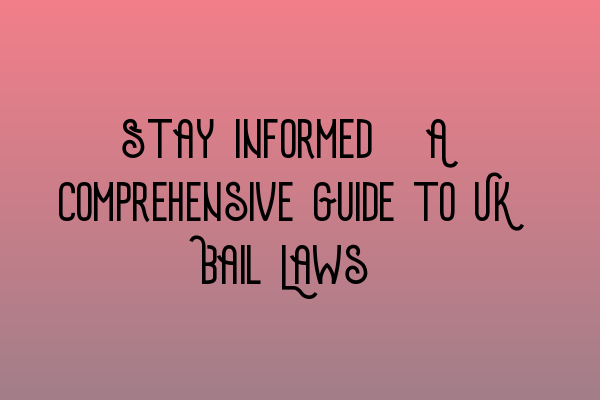Stay Informed: A Comprehensive Guide to UK Bail Laws
Hello and welcome to SQE Criminal Law & Practice Law UK! In today’s blog post, we will provide you with a comprehensive guide to UK bail laws. Whether you are an aspiring solicitor, a law student, or simply someone interested in understanding the intricacies of the legal system, this guide is for you.
Understanding the Basics
Before diving into the specifics, it’s essential to have a solid understanding of the basics of bail in the United Kingdom. Bail is a legal arrangement that allows a person to be released from custody while awaiting trial or sentencing. It serves to ensure that individuals are not unnecessarily deprived of their freedom before being proven guilty.
Now, let’s explore some key aspects of UK bail laws:
The Bail Act 1976
The Bail Act 1976 forms the foundation of the current bail system in the UK. It outlines the principles and procedures governing the granting of bail, as well as the factors considered by the court when making a decision.
If you want to dive deeper into the provisions of the Bail Act 1976, our previous article “Demystifying the Solicitors Qualifying Examination Format” provides a comprehensive overview of this important piece of legislation.
Factors Considered in Bail Decisions
When deciding whether to grant bail, the court considers various factors, including the seriousness of the offense, the likelihood of the defendant fleeing, and the risk that the defendant may interfere with witnesses or evidence. Our article on “LLC Formation Made Simple: Step-by-Step Guide for UK Entrepreneurs” explores the factors considered in more detail.
It’s important to note that the court can impose conditions on bail, such as electronic monitoring, reporting to a police station, or surrendering a passport. These conditions aim to address any potential risks associated with granting bail.
Types of Bail
There are several types of bail that can be granted in the UK, depending on the circumstances of the case:
- Police Bail: This is granted by the police while they are investigating a case. It allows individuals to be released from custody, with or without conditions, until their court appearance.
- Court Bail: This is granted by the court during the pre-trial phase to individuals who have been charged with an offense. Court bail can be granted on the defendant’s own recognizance or with conditions.
- Immigration Bail: This is granted to individuals who are detained under immigration laws. It allows them to be released from detention while their immigration status is being resolved.
If you want to learn more about the different types of bail available in the UK, our article on “LLC Formation: A Step-by-Step Guide for UK Entrepreneurs” provides a detailed explanation of each type.
The Importance of Legal Representation
When dealing with bail matters, it is crucial to have proper legal representation. A skilled solicitor can guide you through the complexities of the legal system, ensure that your rights are protected, and increase your chances of obtaining bail.
Our article on “Business Regulations in the UK: A Comprehensive Overview” offers valuable insights on how to navigate the intricacies of the legal system and find the right legal representation for your specific case.
Ethical Considerations
In the legal profession, upholding ethical standards is of utmost importance. When dealing with bail matters, solicitors must adhere to strict ethical guidelines to ensure fair treatment and equality. Our article on “Ethical Considerations in UK Law: Upholding Professional Standards” explores the ethical considerations relevant to bail cases and emphasizes the importance of maintaining professional integrity.
Remember, staying informed about UK bail laws is essential, whether you are a legal professional, a defendant, or simply an individual interested in the criminal justice system. By understanding the intricacies of bail laws, you can better navigate the legal landscape and make informed decisions.
We hope this comprehensive guide has provided you with valuable insights into UK bail laws. If you have any further questions or require legal assistance, please do not hesitate to contact SQE Criminal Law & Practice Law UK.
